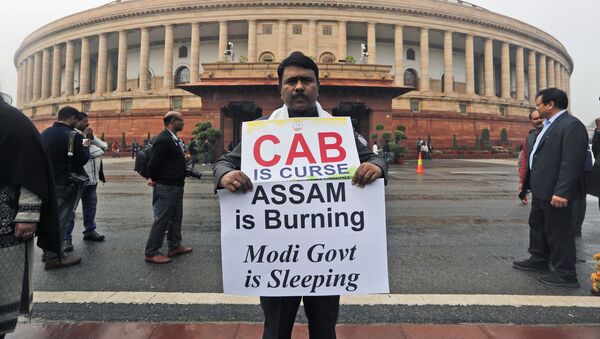Several lawmakers in India's Assam state staged a protest against the contentious CAA outside the legislative assembly on Monday. Most of the lawmakers participating in the sit-in protest belonged to the All India United Democratic Front (AIUDF), Assam's principal opposition party, and they demanded the immediate rollback of the Act.
Assam: MLAs & leaders of All India United Democratic Front (AIUDF) stage protest against Citizenship Amendment Act (CAA), outside the state assembly. A special session of the assembly has been called today for extension of SC/ST reservation, passed by Parliament in December 2019. pic.twitter.com/UBDwcPSNRR
— ANI (@ANI) January 13, 2020
Protesting AIUDF lawmakers at the venue said they have been demanding two-day discussions on the CAA, whereas only one day has been allotted for the issue.
They entered the State Assembly wearing black masks and shouted slogans against the CAA.
The special assembly session, called to discuss the extension of reservations in educational institutions and jobs for people belonging to the marginalised Scheduled Castes (Dalits or lower castes) or Scheduled Tribes (community living in tribal areas of India) sections of society, had to be adjourned for 45 minutes because of the protest.
Protesting lawmakers also demanded the resignation of Assam State Chief Sarbananda Sonowal on the grounds that he was pursuing an agenda in violation of the Assam Accord of 1985, signed between the then Indian Government headed by Prime Minister Rajiv Gandhi and the All Assam Students’ Union (AASU).
In India, various groups involving people from all walks of life, have been protesting at multiple locations against the CAA for the past month. Assam, in particular, has witnessed the influx of millions of Bengali-speaking Hindus since the formation of Bangladesh in 1971 after the Indo-Pak War. Natives of Assam claim that the arrival of these migrants has changed the state's demography and culture over nearly five decades.
9 January marked a month since the mass anti-CAA protests broke out in Assam, and there are no visible signs of them stopping in the immediate future.
The AASU has vowed to continue their agitation until the Act is withdrawn. The state government's attempts to douse the anti-CAA flames by announcing welfare schemes for different sections of society, and providing financial assistance has not yielded results thus far.
Despite the nationwide protests, the government announced the implementation of the new law on 10 January. The Supreme Court of India is scheduled to hear petitions challenging the Act on 22 January. Protesters are claiming that amending the 1955 citizenship law is aimed at dividing the country along religious lines.


